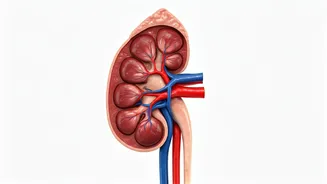Early Morning Hydration
The first habit involves not drinking enough water early in the morning. When one wakes up, the body is already dehydrated after hours of sleep. Insufficient
hydration can elevate the risk of kidney stones and impair kidney function, causing the kidneys to strain to filter waste from the body. Adequate hydration helps maintain blood flow to the kidneys, aiding in efficient waste removal. To mitigate this, consider drinking a glass of water soon after waking up. Add more fluids throughout the morning. This simple adjustment can significantly boost kidney health. Proper hydration helps maintain blood pressure, supporting overall kidney functionality and preventing potential issues. Furthermore, adequate fluid intake dilutes urine, reducing the concentration of substances that can form stones. Make it a habit to sip water throughout the morning. This maintains optimal kidney performance and supports long-term health.
Excessive Caffeine Intake
Next on the list is excessive consumption of caffeinated beverages. While a morning coffee or tea can provide an energy boost, too much caffeine can have detrimental effects on kidney function. Caffeine acts as a diuretic, increasing the frequency of urination, which can lead to dehydration if fluid intake isn't sufficient to compensate. Chronic dehydration stresses the kidneys, making them work harder. Regular, high caffeine intake can also raise blood pressure, a key risk factor for kidney disease. If high blood pressure is not controlled, this can lead to kidney damage over time. To protect your kidneys, consider limiting your caffeine intake. Opt for herbal teas or decaffeinated alternatives. Ensure you drink enough water throughout the day to balance any diuretic effects of caffeine. This balanced approach supports kidney health by maintaining proper hydration and blood pressure levels, reducing the strain on the kidneys. Moderation is key. Observe how your body reacts to caffeine and adjust your intake accordingly, ensuring it doesn't negatively impact your kidney function.
Over-the-Counter Painkillers
The use of over-the-counter painkillers presents another potential morning habit that can be harmful. Frequently using nonsteroidal anti-inflammatory drugs (NSAIDs) such as ibuprofen or naproxen can negatively affect kidney health. These medications reduce blood flow to the kidneys, potentially causing acute kidney injury or worsening existing kidney conditions. While occasional use might be safe, regular consumption, especially without medical guidance, carries risks. If you experience chronic pain, consult a doctor to explore alternative pain management strategies. This helps avoid the potentially damaging effects of NSAIDs on kidney function. If you must use these medications, adhere to the recommended dosages. Be mindful of potential side effects, such as reduced urine output or swelling. Regular check-ups with your physician can also monitor kidney health and detect any early signs of kidney damage. These measures help to protect the kidneys and maintain overall well-being.
Skipping Breakfast
Skipping breakfast can also indirectly affect kidney health. It can influence blood sugar levels and overall metabolic function. Breakfast helps to regulate blood sugar, preventing spikes and crashes that can strain the kidneys. Over time, poor dietary habits and lack of a morning meal may contribute to the development of diabetes and hypertension, both significant risk factors for chronic kidney disease. A balanced breakfast provides essential nutrients and energy needed for the day, supporting optimal kidney function. Include protein, fiber, and healthy fats. This promotes stable blood sugar levels and overall metabolic health. Regular, nutritious breakfasts protect kidneys by reducing the risk of conditions that can damage them. This helps maintain healthy kidney function over the long term. Choose foods like eggs, whole-grain cereals, and fruits, which provide sustained energy and support your kidney health.
Ignoring Morning Bathroom Breaks
Finally, ignoring the urge to urinate in the morning is a habit that can have adverse consequences. Holding urine for extended periods can create a breeding ground for bacteria, increasing the risk of urinary tract infections (UTIs). UTIs, if left untreated, can spread to the kidneys, leading to serious infections. Also, constantly retaining urine increases pressure within the bladder, which can affect kidney function over time. Listening to your body's signals and visiting the restroom regularly is crucial for kidney health. This removes waste products and reduces the risk of infections. Make it a habit to urinate regularly throughout the morning. Avoid postponing bathroom breaks to support overall kidney function and prevent complications. Regular urination helps maintain proper kidney function, reducing the chances of developing infections or other health problems. By attending to your body's needs and adopting these simple adjustments, you can greatly improve your kidney health and overall well-being.















